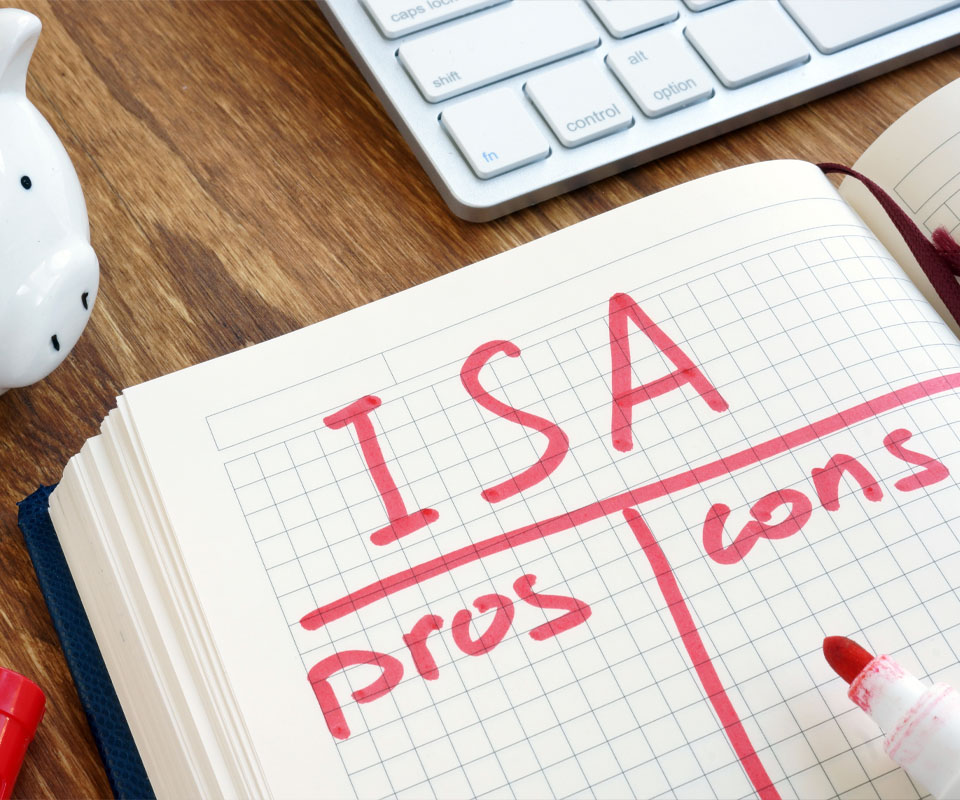ISAs
An ISA can be the most suitable saving and investment method for some people. It can also be used in conjunction with other investments and long-term financial strategies. There are four types of ISAs to choose from; a financial adviser will ensure you make the most suitable and beneficial ISA decision.
What is an ISA?
An Individual Savings Account (ISA) is a type of tax-efficient savings account available to UK residents. These accounts allow individuals to save and invest up to a set threshold each tax year.
There are four types of ISAs - excluding a junior ISA - namely:
- Cash ISAs*
- Stocks and shares ISAs
- Innovative finance ISAs
- Lifetime ISAs
*By referral

What is an ISA?
Cash ISAs can only include cash. Stocks and shares ISAs can only include stocks, shares, unit trusts, government bonds and corporate bonds. Innovative finance ISAs can hold peer-to-peer loans or crowdfunding debentures. Lifetime ISAs can hold cash, stocks and shares. There are limits on how much you can put into an ISA within one tax year. This limit applies across the different types of ISA accounts.

How to set up an ISA
The process of setting up an ISA should be geared towards the individual’s needs and investment expectations, while also explaining all potential risks. The process must begin by comparing the personal and financial circumstances of the individual against the ISA products and other investments in case an ISA isn’t the optimum strategy.
Once an ISA has been identified as most suitable, an application will need to be submitted to set up the ISA, and from there the funds would need to be transferred into the ISA. To make the most of an ISA as an investment, it must be continually monitored and reviewed.

Considerations before using an ISA
Before choosing any ISA or alternative investment product, several considerations should be made:
- Investment amount
- Fees and charges
- Maximum risk exposure
- Access to funds and flexibility
- The client’s longer-term financial goals

Considerations before using an ISA
Due to the aforementioned considerations and others, taking out an ISA is a serious investment. It’s preferable and advisable to receive financial advice before choosing an ISA to invest in.

The benefits of getting ISA advice first
The main benefit of getting ISA advice is it ensures that you only save or invest in a product that matches your circumstances and risk tolerance. Investing without initial ISA advice could put your money at greater risk than you’re willing to take on. Receiving advice could also make you aware of alternative saving and investment opportunities that are more aligned with your needs.

Taylor James ISA services
Consult with a Taylor James financial adviser now and learn what ISA or alternative product is best for your situation. Our friendly advisers are ready to patiently explain all of your options in detail, so you can make informed investment decisions.

Call us today for a no obligation chat about planning your financial future.
Call: 0203 859 3320
Email: contact@taylorjamesfs.co.uk
Please note:
- The value of investments and the income they produce can fall as well as rise. You may get back less than you invested.
- Investors do not pay any personal tax on income or gains, but isas do pay unrecoverable tax on income from stocks and shares received by the isa managers.
- Tax treatment varies according to individual circumstances and is subject to change.
FAQs
Although the UK state pension should theoretically provide enough money for a comfortable retirement, this isn’t always the case. The exact amount you need to retire will depend on personal factors, primarily the lifestyle you wish to lead during retirement and the age you wish to retire. You may need to consider additional pensions or long-term investments to retire comfortably and / or at a time you prefer.
Our advisers assess your personal situation, individual preferences and retirement goals to recommend different pension or investment options. Our team equips clients with the correct knowledge to make informed decisions. We do not pressure clients into choosing a certain type of pension or investment. Our advisers will always make clients aware of any drawbacks or risks of a pension product or investment option, respectively.
You can get pension and investment advice at any age. We offer our pension and investment advisory services to people of all ages without discrimination. We never judge people for choosing our services at a young or older age and only focus on providing the best possible advice for their situation. Do not hesitate to contact our advisers to get started.
There are pros and cons of using a pension or investment to fund retirement. These are best discussed with a financial adviser who understands your exact situation and retirement goals. Some retirement planning strategies will include both pensions and investments. The best option depends on the individual, their retirement goals and risk tolerance.
FAQs
Although the UK state pension should theoretically provide enough money for a comfortable retirement, this isn’t always the case. The exact amount you need to retire will depend on personal factors, primarily the lifestyle you wish to lead during retirement and the age you wish to retire. You may need to consider additional pensions or long-term investments to retire comfortably and / or at a time you prefer.
Our advisers assess your personal situation, individual preferences and retirement goals to recommend different pension or investment options. Our team equips clients with the correct knowledge to make informed decisions. We do not pressure clients into choosing a certain type of pension or investment. Our advisers will always make clients aware of any drawbacks or risks of a pension product or investment option, respectively.
You can get pension and investment advice at any age. We offer our pension and investment advisory services to people of all ages without discrimination. We never judge people for choosing our services at a young or older age and only focus on providing the best possible advice for their situation. Do not hesitate to contact our advisers to get started.
There are pros and cons of using a pension or investment to fund retirement. These are best discussed with a financial adviser who understands your exact situation and retirement goals. Some retirement planning strategies will include both pensions and investments. The best option depends on the individual, their retirement goals and risk tolerance.

